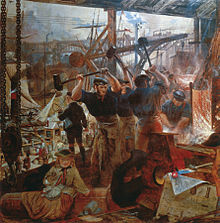
Back عصر صناعي Arabic Industrijsko doba BS Industriezeitalter German Aois na Tionsclaíochta Irish Аж үйлдвэрийн эрин үе Mongolian Endüstri çağı Turkish

The Industrial Age is a period of history that encompasses the changes in economic and social organization that began around 1760 in Great Britain and later in other countries, characterized chiefly by the replacement of hand tools with power-driven machines such as the power loom and the steam engine, and by the concentration of industry in large establishments.[1][2]
While it is commonly believed that the Industrial Age was supplanted by the Information Age in the late 20th century,[3] a view that has become common since the Revolutions of 1989, much of the Third World economy is still based on manufacturing, although mobile phones are now commonplace even the poorest of countries,[4] enabling access to global information networks. Even though many developing countries remain largely industrial, the Information Age is increasingly on the ground.
- ^ Two Views Of The British Industrial Revolution, Peter Temin
- ^ "Industrial-revolution - Define Industrial-revolution at Dictionary.com". Dictionary.com.
- ^ "5 Myths About the 'Information Age'". The Chronicle of Higher Education. 17 April 2011.
- ^ "In much of sub-Saharan Africa, mobile phones are more common than access to electricity". The Economist. 8 November 2017. Retrieved 30 September 2022.
© MMXXIII Rich X Search. We shall prevail. All rights reserved. Rich X Search